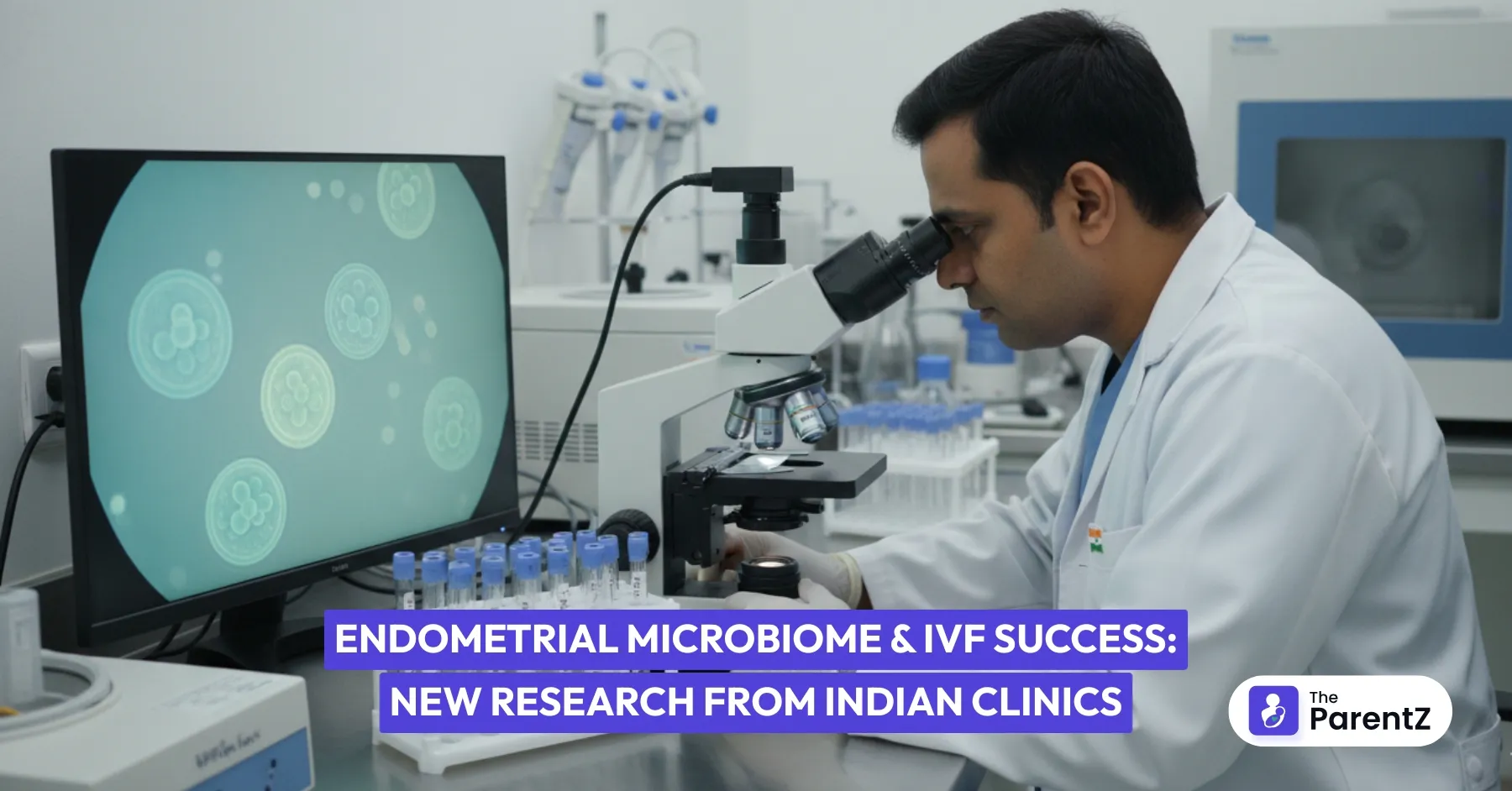If someone had told you five years ago that small bacteria might be the cause of your failed IVF, would you have listened? But what research on Indian fertility is proving is amazing: figuring out the link between the endometrial microbiota and IVF is allowing women who have tried multiple IVF failures to get pregnant.
Before realizing they only needed to balance their uterine bacteria, these women spent years wondering what was wrong. Studies show that about 30% of women with recurrent implantation failure have chronic endometritis, an inflammation linked to bacterial imbalance, with untreated cases seeing rates as low as 11.5%. Proper diagnosis and treatment can thus lead to improved reproductive outcomes.
What is the Endometrial Microbiome?
Your uterus needs to have the correct conditions of bacteria in order for an embryo to implant, the same way a garden needs the ideal type of soil. This group of bacteria that is present on the lining of your uterus is called the "endometrial microbiome."
Lactobacillus bacteria are the primary contributors to a healthy endometrial microbiome. If more than 90% of your endometrial microbiome is composed of these beneficial bacteria, doctors define this condition as "Lactobacillus dominance." This is the ideal environment for conception.
However, dysbiosis is a condition where bad bacteria outnumber good ones. This can lower the success of implantation. Scientists say that the proper implantation and development of your embryo depend on the balance of the different bacteria that live in your body
Groundbreaking Research from Indian Fertility Clinics
Indian fertility experts were the first to identify the impact of the endometrial microbiota on IVF success. In June 2024, 14 leading fertility experts from Indian cities, including Hyderabad, Pune, Ahmedabad, and Bhubaneswar, collaborated to study decades of clinical data. This study is revolutionizing IVF practice in India.
Research involving 100 Indian women who were experiencing infertility that could not be explained was remarkable. Women with Lactobacillus-dominant vaginal microbiota had a clinical pregnancy rate of 56.9%, while those without this bacterial balance had a rate of 28.6%. Women with Lactobacillus dominance had an implantation rate improvement of 41.3%, while those with dysbiotic profiles had an improvement of 22.5%. These results show that preserving a healthy microbiome in the reproductive tract and vagina can greatly enhance IVF results, almost doubling the likelihood of a clinical pregnancy.
Understanding IVF Success Factors in India
When couples think about IVF success factors in India, they most often focus on age, egg quality, sperm parameters, and embryo quality. These are still significant, but the endometrial microbiota is starting to gain importance despite being frequently disregarded.
Traditional IVF success factors include embryo quality, ovarian reserve as measured by AMH levels, and maternal age (women under 35 have 40–60% success rates). Even when all of these elements are at their peak, some couples still experience recurring failures. Now is the time to understand your endometrial microbiota.
Studies show that women with primary infertility (never been pregnant previously) will tend to have more healthy Lactobacillus levels compared to women with secondary infertility (formerly pregnant). This indicates that past reproductive issues or infection may have changed the bacterial balance over time.
The Science Behind Lactobacillus and Pregnancy Success
Why is Lactobacillus important to IVF success? These beneficial bacteria work in several important ways to get your uterus ready for your developing embryo.
First, the Lactobacillus bacteria produce lactic acid, which keeps your uterus slightly acidic. This pH's acidity guards against dangerous bacteria that can lead to inflammation or infections. Second, the natural antimicrobial compounds in these bacteria serve as bodyguards, keeping dangerous microorganisms from getting to the lining of your uterus.
There are some of the Lactobacillus group that are particularly notable. Lactobacillus crispatus concentrations were significantly higher in women who had given birth to live infants, as per studies. L. iners, found in 37% of all successful IVFs but only 16.7% of all unsuccessful IVFs, is another useful species.
On the other hand, IVF failure has been connected to certain harmful bacteria. Women with secondary infertility are more likely to have Gardnerella vaginalis, which is also associated with lower implantation rates. Similarly, bacteria like Staphylococcus, Enterobacteriaceae, and Atopobium vaginae can negatively impact your chances of a successful implantation.
The disparity in results is dramatic. Indian clinical studies reveal that restoring Lactobacillus predominance increased live birth rates from a mere 11.1% in untreated conditions to a whopping 57.1% in treated conditions.
Probiotic Treatment: A Simple Solution
The good news is that enhancing your endometrial microbiome does not take complicated procedures. Indian experts in fertility have come to a resounding consensus: oral probiotic supplementation beginning 1-2 months prior to embryo transfer can markedly improve your success rates.
Ten billion colony-forming units (CFU) of several advantageous Lactobacillus strains are present in the suggested probiotic formulation. L. acidophilus, L. rhamnosus, L. reuteri, L. plantarum, L. casei, and L. fermentum are among them. This mixture helps restore your reproductive tract's natural bacterial balance.
Beyond oral supplementation, lifestyle modifications play a crucial role in nurturing a healthy endometrial microbiome. Dietary choices particularly matter—incorporating fermented foods like yogurt, kefir, and traditional Indian preparations such as kanji and idli batter can naturally boost beneficial bacteria. Additionally, reducing stress through practices like yoga and meditation, maintaining adequate sleep, and avoiding unnecessary antibiotic use all contribute to creating an optimal environment for Lactobacillus dominance.
Many fertility specialists also recommend vaginal probiotics as a complementary approach, which deliver beneficial bacteria directly to the reproductive tract, though this should always be discussed with your doctor as part of your personalized treatment plan.
Treatment is safe, tolerable, and can be used in combination with other treatments for fertility. If you've got chronic endometritis, your doctor might initially give you antibiotics to help get rid of the infection, followed by probiotics to restore your healthy community of beneficial bacteria.
Testing Options Available in India
If you've been having multiple IVF failures, getting your endometrial microbiome tested might give you some important answers. Now, companies like Igenomix India provide you with complete testing called EndomeTRIO that checks your endometrial health. This test involves sophisticated 16S rRNA gene sequencing that will tell you precisely which bacteria are present in your endometrium.
The testing procedure is simple. During the follicular phase of your cycle, which is the first half of your menstrual cycle, your doctor will take a tiny endometrial sample. After that, the sample is examined to identify any dangerous bacteria and calculate your Lactobacillus dominance percentage.
Based on Igenomix research, endometrial causes account for approximately 20% of infertility. Testing is especially advised if you've experienced two or more unsuccessful IVF attempts, have been diagnosed with chronic endometritis, or suffer from unexplained infertility following normal tests.
Take Action for Your Fertility Journey
Learning the endometrial microbiome IVF link provides you with yet another strong tool in your quest for fertility. If you're contemplating IVF or have had a history in the past, think about asking your fertility expert about testing the microbiome. The research data demonstrates that this easy intervention might easily increase your chances of taking home a baby.
The science of endometrial microbiome IVF is advancing at a rapid pace, and Indian fertility clinics are at the vanguard of bringing this science into practical application. With Lactobacillus dominance being demonstrated to enhance IVF success by almost threefold, perfecting your endometrial microbiome may be the answer to finally realizing your dream of having a family.
Do you want individualized advice for your fertility journey? Get The ParentZ app today and monitor your health, consult with fertility specialists, and leverage evidence-based information to guide you through every step towards parenthood. Visit ParentZ website for more information.
References:
- https://pubmed.ncbi.nlm.nih.gov/25385744
- https://pmc.ncbi.nlm.nih.gov/articles/PMC8745284/
- https://pmc.ncbi.nlm.nih.gov/articles/PMC12016387/
- https://www.healthline.com/health/digestive-health/dysbiosis
- https://pmc.ncbi.nlm.nih.gov/articles/PMC12016387/
- https://pubmed.ncbi.nlm.nih.gov/25385744/
- https://pmc.ncbi.nlm.nih.gov/articles/PMC10751858/





Be the first one to comment on this story.